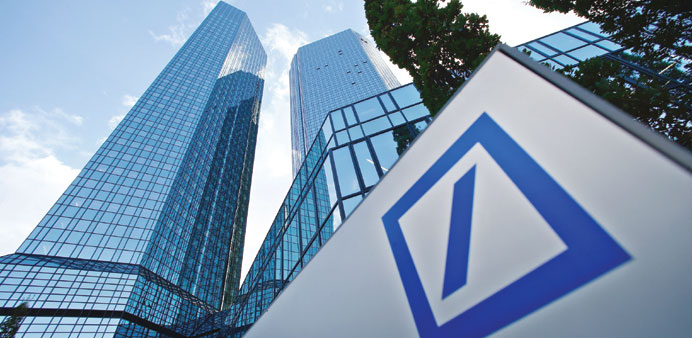The Deutsche Bank headquarters in Frankfurt. The latest investigation is one of a number of legal problems that are threatening to stall Deutsche’s efforts to pull out of excessively risky businesses and change its corporate culture after the scandals and fines that followed the financial crisis of 2008.
Reuters/Munich
German prosecutors have widened an investigation of Deutsche Bank’s co-chief executive Juergen Fitschen to include the bank itself, deepening legal problems as it tries to transform its culture after the financial crisis.
The Munich public prosecutor named Fitschen earlier this week as a suspect in an investigation into whether he offered misleading evidence about a decade-old dispute over the collapse of the Kirch media empire.
A spokesman for the prosecutor said yesterday that if the investigation led to Fitschen going on trial, then so could his bank. “Should this result in an indictment and the opening of court proceedings, then Deutsche Bank itself would be sitting in the dock,” the spokesman said.
“If we have sufficient grounds to suspect that a representative of a company can be prosecuted, then there is the possibility to fine the company itself,” he added.
Media tycoon Leo Kirch had claimed that, in 2002, then-Deutsche chief executive Rolf Breuer brought about his German media group’s downfall by questioning its creditworthiness in a television interview. The bank and its officers denied that.
Kirch has since died but his heirs have bought a civil suit against the bank. Prosecutors are now investigating whether Fitschen gave misleading evidence in the case - making this the second inquiry to be launched into the co-CEO in as many years.
A spokesman for Deutsche Bank repeated that the bank was “absolutely confident” that the Kirch investigation would prove unfounded and declined to comment further.
The latest investigation is one of a number of legal problems that are threatening to stall Deutsche’s efforts to pull out of excessively risky businesses and change its corporate culture after the scandals and fines that followed the financial crisis of 2008.
It also marks a setback for Fitschen, 65, who rose to the top of the bank in 2012 as a counterweight representing Germany’s traditionally conservative banking values to his fellow co-CEO, Indian-born Anshu Jain, who drives Deutsche’s money-spinning investment bank.
“If charges are brought, Mr. Fitschen will need to draw the consequences because he would no longer be credible as the person meant to represent the cultural transformation,” said Klaus Nieding, head of German small-shareholders lobby DSV.
Deutsche Bank board member Stephan Leithner, however, tried to play down his concern about the case. “In general, I sleep very well,” he told reporters.
Fitschen is meant to represent a traditional face to domestic clients as someone steeped in Germany’s “Mittelstand”, the small- and medium-sized businesses that form the backbone of Europe’s largest economy.
But the inquiry into possible attempted fraud, a criminal offence that carries a maximum five-year prison sentence, casts a shadow over Fitschen and has led one investor to suggest that a change in the Fitschen-Jain leadership may be needed.
“The leadership pair have made pretty good progress in the restructuring of the bank but it is very regrettable that the successes are getting overshadowed increasingly by court cases and charges,” the top-five shareholder said, requesting anonymity.
Germany’s flagship lender is already burdened by other regulatory inquiries, including one into whether its traders helped to rig Libor reference interest rates. It booked €1.2bn ($1.6bn) in legal costs in the third quarter of 2013 alone, wiping out profit for that period and taking total legal provisions to €4.1bn.
European Union antitrust regulators are set to fine six global banks including Deutsche after an investigation into the rigging of benchmark eurozone interest rates, a person familiar with the matter said on Tuesday. Deutsche declined to comment. Fitschen is also among 25 employees being investigated on suspicion of tax evasion, money laundering and obstruction of justice over trading in carbon emission permits.
The Frankfurt prosecutor said the tax inquiry is running at full speed but is unlikely to finish before the year-end. “It is not possible to estimate when the investigation may reach a conclusion,” a spokesman for the prosecutor said.
A spokesman for Deutsche Bank said that Fitschen declined to comment personally on the Kirch probe.

